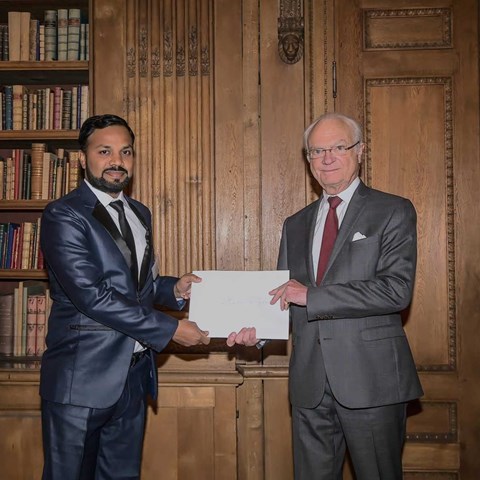Researcher Mudassir Iqbal has received an award for research on biological pesticides from King Carl XVI Gustaf 50th Anniversary Fund for Science, Technology and Environment. The scholarship was awarded on May 25 in the Royal Palace.
Mudassir Iqbal received an award of SEK 85,000 for research on optimization of biological plant protection products. The scholarship will be used for field testing in Europe and for a stay with a world-leading researcher in Italy.
– I will study the evolutionary factors that enable beneficial organisms to develop the ability to effectively fight disease-causing organisms, says Mudassir.
– Mudassir came to Sweden from Pakistan in 2015 and has since made a remarkably inspiring research journey. The project Mudassir works with is innovative and has great potential to, in the long run, provide Swedish farmers with biological pesticides that are significantly more effective than the biological agents we have today, says Professor Johan A. Stenberg who leads the group at the Department of Plant Protection Biology in Alnarp, where Mudassir is now working on his post doc project.
Swedish agriculture is dependent on effective plant protection products
Competitive Swedish agriculture depends on secure access to effective plant protection products to counteract pests and pathogens. However, chemical plant protection products are often harmful to the environment and biodiversity. The European Commission's goal is therefore to reduce the use of chemical plant protection products by 50% by 2030 (Green Deal - Farm to Fork Strategy).
– For Swedish agriculture to meet the environmental requirements and the international competitive situation, it is necessary that the biological plant protection products are developed rapidly so that they become as effective as the chemical agents, says Mudassir.
– It is amazing to receive this award, I feel honored! The scholarship is a recognition of the many hours of hard work and time away from the family that has resulted in this valuable research project. This would not be possible without the support of my family and of course my mentor, Professor Johan A. Stenberg. I want to take this opportunity to say a big THANK YOU to them for their support and cooperation!
